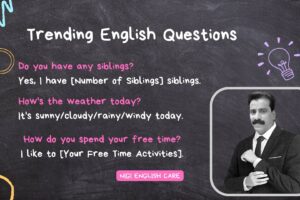
How to Speak English Fluently Like a Native Speaker
Speak English Fluently
Hello Everyone! In this blog post, I am telling you how to speak English fluently like a native speaker. English is the most widely spoken language in the world, and it is becoming increasingly important to be able to speak it fluently. If you are looking to improve your English speaking skills, there are a few things you can do.
1. Immerse yourself in the language.
The best way to learn a language is to immerse yourself in it. This means surrounding yourself with English as much as possible. You can do this by watching English-language movies and TV shows, listening to English music, and reading English books and articles. You can also try to find opportunities to speak English with native speakers.
2. Practice regularly.
The more you practice speaking English, the better you will become at it. Try to set aside some time each day to practice speaking English. You can do this by talking to yourself, practicing with a friend or family member, or joining an English conversation group.
3. Learn the basics of grammar and pronunciation.
While it is not necessary to be a grammar expert, having a basic understanding of grammar will help you to speak English more fluently. You should also learn the basic rules of pronunciation, as this will help you to be understood by native speakers.
4. Use online resources.
There are a number of online resources that can help you to improve your English speaking skills. These resources include websites, apps, and online courses.
5. Don’t be afraid to make mistakes.
Everyone makes mistakes when they are learning a new language. The important thing is to not let this discourage you. Just keep practicing and you will eventually become fluent.
Here are some additional tips for speaking English fluently:
- Pay attention to your accent. If you have a strong accent, it can be difficult for native speakers to understand you. Try to listen to native speakers and mimic their pronunciation.
- Use natural pauses. When you speak English, don’t be afraid to use natural pauses. This will help you to catch your breath and collect your thoughts.
- Don’t be afraid to ask for help. If you are struggling to understand something or to express yourself, don’t be afraid to ask for help. Native speakers will be happy to help you.
With regular practice, you will be speaking English fluently in no time!
Here are 50 expressions that are used in our daily life:
- I see. This expression is used to show that you understand what someone is saying.
- I hear you. This expression is similar to “I see,” but it is often used in a more informal setting.
- No problem. This expression is used to say that you are happy to help someone.
- You’re welcome. This expression is used to thank someone for their help.
- Sure thing. This expression is used to say that you will do something that someone has asked you to do.
- No way! This expression is used to express surprise or disbelief.
- Really? This expression is used to ask for confirmation of something that someone has said.
- I’m not sure. This expression is used to say that you do not know the answer to a question.
- I think so. This expression is used to say that you believe something is true, but you are not completely sure.
- I’m not sure if I can. This expression is used to say that you are not sure if you are able to do something.
- I’ll try. This expression is used to say that you will attempt to do something.
- I’ll let you know. This expression is used to say that you will give someone an update on something.
- I’m sorry. This expression is used to apologize for something that you have done or said.
- Excuse me. This expression is used to get someone’s attention or to apologize for interrupting someone.
- Thank you. This expression is used to show gratitude for something that someone has done.
- You’re welcome. This expression is used to respond to a thank you.
- Please. This expression is used to ask someone to do something.
- Can you help me? This expression is used to ask someone for help.
- Do you mind? This expression is used to ask someone if they would mind doing something.
- It’s my pleasure. This expression is used to say that you are happy to do something for someone.
- I’m glad I could help. This expression is used to say that you are happy that you were able to help someone.
- No big deal. This expression is used to say that something is not a big problem.
- It’s no problem. This expression is similar to “No big deal,” but it is slightly more formal.
- I’m fine. This expression is used to say that you are not feeling well.
- I’m not feeling well. This expression is more specific than “I’m fine,” and it is used to say that you are experiencing some kind of illness.
- I’m sick. This expression is used to say that you are very ill.
- I’m not feeling up to it. This expression is used to say that you are not feeling well enough to do something.
- I’m not feeling well enough to go out tonight. This expression is more specific than “I’m not feeling up to it,” and it is used to say that you are not feeling well enough to go out for the evening.
- I’m not feeling well enough to go to work today. This expression is similar to “I’m not feeling well enough to go out tonight,” but it is used to say that you are not feeling well enough to go to work.
- I’m sorry, I can’t. This expression is used to say that you are not able to do something.
- I’m sorry, I’m busy. This expression is similar to “I’m sorry, I can’t,” but it is used to say that you are not able to do something because you are busy.
- I’m sorry, I’m not interested. This expression is used to say that you are not interested in doing something.
- I’m sorry, I have to go. This expression is used to say that you need to leave.
I hope this blog post has been helpful. If you have any questions, please feel free to ask.
Tag:EFL, English as a second language, English conversation practice, English fluency tips, English language, English learning, English pronunciation, ESL, improve English speaking skills, language acquisition, language immersion, Language Learning, language practice, learn English grammar, online English resources, speak English fluently



